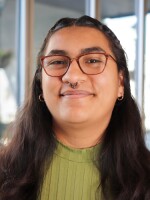The Community is a Milwaukee nonprofit working to change the narrative around people with criminal records. It aims to foster dialogue about how the justice system impacts individuals and how it can change for the better.
Next week, The Community, along with partner organizations, will host the fifth annual Correcting the Narrative Celebration. It’s a week of events confronting the realities of the criminal legal system. Events include simulations of different aspects of incarceration, such as solitary confinement and giving birth in prison. There will also be a documentary screening and panel discussions about higher education in prisons.
The events take place at local college campuses, including the University of Wisconsin-Milwaukee and Carroll University. Carl Fields is the Executive director of Correcting the Narrative for The Community.
This interview has been edited for length and clarity.
Maria Peralta-Arellano: Can you talk about the initiative and what can people expect?
Carl Fields: I would say the current narrative is one dominant narrative and a bunch of smaller narratives. We certainly are working hard, not just at The Community, but organizations overall, to correct that. Reason being because that narrative speaks to people who are system impacted, people who are justice impacted, i.e., having been convicted of a crime, having been in the system, through the system, as people who are incorrigible, people who are not worthy of investment.
There’s a big deserving-versus-not conversation involved in this whole ecosystem that we work in. One of the things that we push hard for are two things. One is the way with which a person carries their accountability for their choices. The other is how a person is allowed to come back into the community. And if that receiving of a person is done. We believe that it’s not. We also believe that is because of the things that communities tell themselves, but also our investment, or lack thereof, in people coming back well.
Taking a look that are coming up like the prison birth simulation, a solitary cell experience, a criminal legal system simulation as well. Why did we choose simulations to be the basis of these events instead of having a week full of real screenings that are also featured or just open dialogue with communities?
This is one of those times where each and every annual celebration has been a different bite at the apple. This particular one, we’ve done a lot of different simulations because we’ve worked our way up to this. The birthing simulations have gone well around the state and around the country. The supervision simulations have gone well. Our particular focus with our simulation is long-term supervision and what that means. If the focus and the goal of corrections is to be rehabilitative and bring people back well, lower the recidivism rate, and put tools in the kits of the people who are in their care, is that happening, and what does it mean? When is a person ‘rehabilitated’? And the current measures, are they accurate enough? Are they too low?
We believe that, at least from a personal perspective, we believe that the recidivism rate measure is too low a bar. We need a much higher bar than that. We certainly need to be able to track that alongside people in the community.
Is there any event specifically that you are looking forward to, or is something that occurs, with every celebration that you are looking forward to and why?
I think being in a simulated exercise really helps a person to get in their guts, and different sorts of things start to spark. I talk about it all the time, when it comes to football. You know, I'm a Bears fan, so I know behind enemy lines, but that's okay. We talk about it all the time how, you know, making a statement about the guy who missed that catch, or, you know, he didn't get that throw right. That's very easy to say from the couch, watching it on a weeknight game. It's another all together to understand the level of athleticism that it takes to play to do that. That is extremely hard catch to catch. If you don't understand that, it's easy to be displaced. It's easy to make statements like, like that one. And so I think the same goes for corrections. We want people to understand that we are living up to our ideals as a state and as a country ultimately, when we take people out of the community. We're simply not taking them out of the community because they've done something wrong, but because we want to help them make the necessary behavioral adjustments that produces public safety, not we want to mistreat this person because they mistreated somebody. That's not the purview of the car system, at least it's not supposed to be.
To learn more about The Community, Correcting the Narrative Celebration and register for events you can visit their website.





